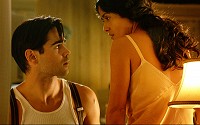
with Colin Farrell, Salma Hayek, Idina Menzel, Donald Sutherland, Eileen Atkins, Justin Kirk, William Mapother, Jeremy Crutchley, Dion Basco, Tamara Craig Thomas
release US 10.Mar.06, UK 2.Jun.06
06/US Paramount 1h57

Steamy glances: Farrell and Hayek



 Support Shadows: Buy a Poster
Support Shadows: Buy a Poster
|
 Based on the 1939 novel by John Fante, this film tells another iconic story from Los Angeles' history. Although it's an intriguing companion piece to Towne's Chinatown, this film is too dull to really spring to life.
Based on the 1939 novel by John Fante, this film tells another iconic story from Los Angeles' history. Although it's an intriguing companion piece to Towne's Chinatown, this film is too dull to really spring to life.
Depression-era writer Arturo Bandini (Farrell) holes up in a downtown hotel to write the Great American Story. But the war veteran (Sutherland) in the next room keeps dropping by and the landlady (Atkins) keeps asking for the rent. With his last nickel, Arturo buys a cup of coffee and meets the feisty waitress Camilla (Hayek). There's a clear attraction, but neither wants to admit it. Arturo dreams of finding the perfect California blonde; Camilla wants to marry a guy with an American name. Not even close.
Towne gets the atmosphere exactly right--moody, dusty, desperate. These are people seeking success and happiness in an emerging city of dreams, although nothing is going as planned. The characters are all fascinating bundles of contradictions--tolerant but prejudiced, hopeful but fatalistic, gifted but aimless. They're foreigners colliding in a strange landscape where Camilla is actually the rightful resident, but is made to feel most foreign of all.
Performances nicely catch this tone. Farrell and Hayek generate considerable chemistry in their prickly courtship, creating memorable characters we recognise from both literary and cinematic history. L.A. noir is almost a genre of its own, with the conflicted brooding, jagged interaction and a refusal by everyone to show who they really are. The entrance of a rambunctious mystery woman (Menzel) is almost expected. As are the earthquakes and sunsets and beachfront idylls. Not to mention the tragedies.
The central idea is that it's impossible to really create fiction unless you've lived it first. Arturo can't write about love and loss until he has experienced something--anything. And Towne catches this idea beautifully, while cleverly recreating 1930s Los Angeles in various South African locations. Where the film stumbles is in its lack of drive--not much actually happens, and with all the moping we begin to lose interest. Bu the end it just feels wordy, corny and unconvincing. Which is a real pity with this much talent on screen.
 |
themes, sexuality, language | 10.Apr.06 |

 Still waiting for your comments ... don't be shy.
Still waiting for your comments ... don't be shy.
HOME | REVIEWS | NEWS | FESTIVAL | AWARDS | Q&A | ABOUT | TALKBACK